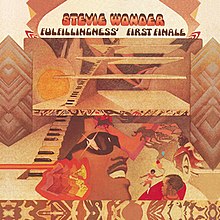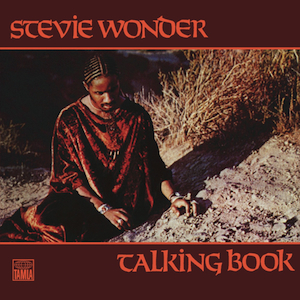
Talking Book is the fifteenth studio album by American singer, songwriter, and musician Stevie Wonder, released on October 27, 1972, by Tamla, a subsidiary of Motown Records. This album and Music of My Mind, released earlier the same year, are generally considered to mark the start of Wonder's "classic period". The sound of the album is sharply defined by Wonder's use of keyboards and synthesizers.
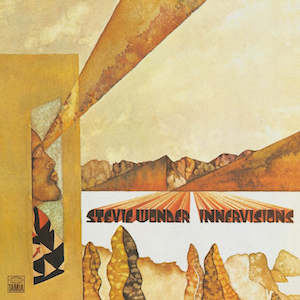
Innervisions is the sixteenth studio album by American singer, songwriter, and musician Stevie Wonder, released on August 3, 1973, by Tamla, a subsidiary of Motown Records. A landmark recording of Wonder's "classic period", the album has been regarded as completing his transition from the "Little Stevie Wonder" known for romantic ballads into a more musically mature, conscious, and grown-up artist. On the album, Wonder continued to experiment with the revolutionary T.O.N.T.O. synthesizer system developed by Malcolm Cecil and Robert Margouleff, and Innervisions became hugely influential on the future sound of commercial soul and black music.

"Superstition" is a song by American singer-songwriter Stevie Wonder. It was released on October 24, 1972, as the lead single from his fifteenth studio album, Talking Book (1972), by Tamla. The lyrics describe popular superstitions and their negative effects.

Music of My Mind is the fourteenth studio album by American singer, songwriter, and musician Stevie Wonder. It was released on March 3, 1972, by Tamla Records, and was Wonder's first to be recorded under a new contract with Motown that allowed him full artistic control over his music. For the album, Wonder recruited electronic music pioneers Malcolm Cecil and Robert Margouleff as associate producers, employing their custom TONTO synthesizer on several tracks. The album hit No. # 21 in the Billboard LP charts, and critics found it representative of Wonder's artistic growth, and it is generally considered by modern critics to be the first album of Wonder's “classic period”.

Silver Rain is an album by bassist Marcus Miller. Named after a poem by Langston Hughes, it was released in 2005.

Cyclone is the eighth studio album by Tangerine Dream and the first in their canon to feature proper vocals and lyrics. The cover is a painting by band leader Edgar Froese.

"You Haven't Done Nothin" is a 1974 funk single by Stevie Wonder, taken from his album Fulfillingness' First Finale and featuring background vocals by the Jackson 5. The politically aware song became Wonder's fourth Number 1 pop hit and his tenth Number 1 soul hit. It also reached Number 1 in Canada. In the UK the single spent five weeks on the chart, peaking at Number 30.

"Boogie On Reggae Woman" is a 1974 funk song by American Motown artist Stevie Wonder, released as the second single from his seventeenth studio album, Fulfillingness' First Finale, issued that same year. Despite the song's title, its style is firmly funk/R&B and neither boogie nor reggae. It continued Wonder's successful Top Ten streak on the pop charts, reaching number three and also spent two weeks at number one on the soul charts. Billboard ranked it as the No. 26 song for 1975. At the 17th Grammy Awards, Stevie Wonder won the Best R&B Vocal Performance, Male for this song.
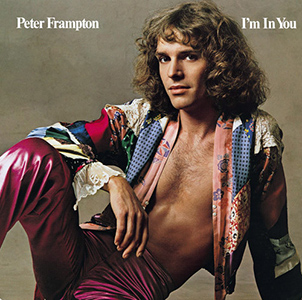
I'm in You is the fifth studio album by English musician and songwriter Peter Frampton. It was released on 3 June 1977, almost a year and a half after his 1976 signature breakthrough live album, Frampton Comes Alive! It was recorded at Electric Lady Studios in New York, where Frampton's Camel was recorded four years earlier. Stevie Wonder, Richie Hayward, Mike Finnigan and Mick Jagger are featured on the album.

Lite Me Up is a pop album with a strong disco-funk feel by Herbie Hancock. It was Hancock's first release without producer David Rubinson since 1969. On this album, Hancock was influenced by his long-time friend, producer Quincy Jones and sessions included many musicians associated with Jones including Steve Lukather and Jeff Porcaro of Toto. The album was the first on which Hancock played the Synclavier, a digital polyphonic synthesizer.

Baby It's Me is the eighth studio album by American singer Diana Ross, released on September 16, 1977 by Motown Records. It peaked at No. 18 on the Billboard Top 200 and No. 7 on the R&B album chart. The album was produced by producer Richard Perry. The LP yielded one top 40 hit, "Gettin' Ready for Love", reaching number 27 on the US Billboard Hot 100. Other charting singles released from the album include "You Got It" and "Your Love Is So Good for Me", the latter receiving a Grammy nomination.

The Dream Weaver is a solo album by American singer and musician Gary Wright released in July 1975.

Free is a studio album by jazz bassist Marcus Miller, released in 2007.

Tap Step is a studio album recorded by Chick Corea in 1979 & 1980. It features previous Corea collaborators Flora Purim, Joe Farrell, Stanley Clarke and Gayle Moran, along with percussionists Airto, Don Alias and Laudir de Oliveira.

Plush Funk is the third installment of the George Clinton Family Series collection. The album was released in 1993 by P-Vine Records in Japan, and then was released the next year by AEM Records in the United States and Sequel Records in the United Kingdom. The CD features the track "May Day (S.O.S)", which was an outtake from the Funkadelic album "The Electric Spanking of War Babies".

Out of Payne Comes Love is Freda Payne's sixth American released album, released in 1975. All of the tracks except for "Million Dollar Horse" would be later issued on the collection Lost in Love.

Love Brought Me Back is the fifth album by D. J. Rogers, released in 1978. It was recorded at Bolic Sound and Total Experience Recording Studio. This would be D. J. Rogers first Columbia Records album.

Keeping Our Love Warm is the sixth studio album by the American duo Captain & Tennille. Issued in 1980, it was their final full-length release recorded for Casablanca Records.
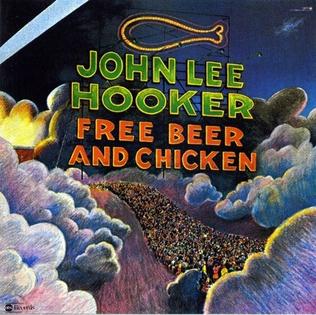
Free Beer and Chicken is an album by blues musician John Lee Hooker recorded in California in 1974 and released by the ABC label the same year.

Yvonne Lowrene Wright was an American songwriter and vocalist best known for co-writing with Stevie Wonder in the 1970s. Their songs appear on the albums Music of My Mind, Talking Book, Fulfillingness' First Finale, and Stevie Wonder's Journey Through "The Secret Life of Plants".
